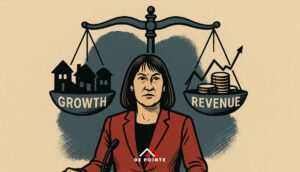Article

As the UK prepares for the upcoming Autumn budget, Chancellor of the Exchequer Rachel Reeves is navigating a challenging fiscal landscape. The budget, set for October 30th, will be the first under the new Labour government led by Prime Minister Keir Starmer, marking Labour’s return to leadership after 14 years. Many are concerned that the budget will feature a slew of tax hikes ranging from Capital Gains to Inheritance Tax.
Jeremy Hunt’s Criticisms
Former Chancellor Jeremy Hunt has been vocal about his concerns, accusing Reeves and the Labour Party of planning to raise taxes significantly. Hunt claims that the Labour government is reverting to a historical pattern of tax hikes, a sentiment he expressed via social media following Reeves’ admission that taxes will likely be increased to address the £22 billion deficit left by the previous administration.
Tough Choices Ahead
Reeves herself has acknowledged the necessity of making “tough choices” in the forthcoming budget. Among these decisions is the cessation of winter fuel payments for certain pensioners, a move aimed at redirecting funds more effectively within the strained public finances. Moreover, the Labour Party plans to tackle the issue of non-domiciled residents, known as ‘non-doms,’ who benefit from tax privileges. Beyond this, there is a great deal of speculation surrounding the potential for tax hikes to be at the forefront of the Autumn election.
Proposed Tax Changes
Several potential tax changes have been speculated, indicating a more aggressive stance on wealth and investment income:
• Capital Gains Tax (CGT): Reeves has hinted at aligning CGT rates more closely with income tax rates. This change could significantly increase tax liabilities for those profiting from the sale of assets such as property and shares.
• Inheritance Tax: Although specifics are yet to be detailed, there is speculation that inheritance tax reforms could be on the table, potentially increasing the tax burden on large estates.
• Business Rate Relief for AIM Shares: Plans to end this relief reflect Labour’s strategy to close loopholes and ensure that wealthier investors contribute more to public revenues.
The above chart documents the tax revenue generated each year from CGT and IHT with projections to 2028 showing sharp rises.
Impact on Investors
The proposed tax changes are likely to have significant implications for investors. Here’s a closer look at how each proposed measure might impact different types of investors and investment strategies:
1. Capital Gains Tax:
• Increased Tax Burden: Aligning CGT with income tax rates could substantially raise the tax burden on capital gains. Currently, CGT rates are lower than income tax rates, incentivising investment in assets like property and shares. An increase in CGT rates could reduce the attractiveness of these investments, potentially leading to a decrease in market activity.
• Investor Behavior: Investors might alter their behaviour to mitigate the impact of higher taxes. This could include holding onto assets longer to defer tax liability or seeking investments that offer tax advantages under the new regime.
• Impact on the Market: A shift in investment behaviour could affect liquidity and valuations in markets, particularly if investors begin to exit positions to avoid higher future taxes. This could lead to short-term volatility and adjustments in asset prices.
2. Inheritance Tax:
• Estate Planning: Potential changes to inheritance tax could prompt individuals to reconsider their estate planning strategies. Higher inheritance taxes might incentivise the use of trusts, gifts, and other mechanisms to transfer wealth more tax-efficiently.
• Impact on High-Net-Worth Individuals: Those with significant assets could be particularly affected, leading to more sophisticated financial planning to minimise tax liabilities. This could also impact the advisory business as demand for estate planning services increases.
3. Business Rate Relief for AIM Shares:
• Investment in AIM Companies: Ending business rate relief for AIM shares could make investments in smaller, growth-oriented companies less attractive. The AIM (Alternative Investment Market) is known for its tax incentives, which attract investors seeking higher-risk, higher-reward opportunities. Removing these incentives could reduce capital inflows into AIM-listed companies.
• Startups and Small Businesses: AIM companies, often startups and small businesses, could face challenges in raising capital if investor interest wanes due to less favourable tax treatment. This might impact innovation and growth in the sector.
Economic and Political Context
The Labour government is facing a significant fiscal challenge, exacerbated by their decision to accept the Pay Review Body’s recommendation for public sector pay rises, which will cost an additional £9 billion. This decision, while aimed at addressing public sector wage stagnation, further strains the budget and increases the likelihood of tax hikes to balance the books.
Moreover, the current state of the UK economy, characterised by stagnant growth and high debt levels, provides limited flexibility for expansive fiscal policies. The Labour government has committed to not increasing taxes on working people, which includes a pledge not to raise income tax, VAT, or national insurance. This guarantee leaves wealth and investment taxes as primary targets for generating additional revenue.
Reeves’ approach reflects a broader strategy of fiscal consolidation while attempting to protect key voter bases from direct tax hikes. This balancing act is crucial as the government seeks to maintain public support while addressing significant fiscal challenges.
In conclusion, the Labour Party’s first budget in over a decade is poised to introduce significant tax reforms aimed at addressing the fiscal deficit while balancing their electoral promises. The political and economic ramifications of these decisions will be closely watched as Reeves and her team navigate these complex challenges. Investors, in particular, will need to stay informed and possibly adjust their strategies in response to the changing tax landscape.






